
Acta Polytechnica Hungarica
metrics 2024
Unlocking Potential, Sharing Discoveries
Introduction
Acta Polytechnica Hungarica is a prestigious journal dedicated to disseminating innovative research in the fields of engineering and multidisciplinary studies. Published by BUDAPEST TECH, this journal has established itself as a valuable resource since its inception in 2004, with plans to continue until 2024. With an impressive Q2 ranking in both Engineering (miscellaneous) and Multidisciplinary categories as of 2023, it ranks #68 out of 307 in the Scopus Engineering sector, placing it in the 78th percentile of its field. The journal promotes open access to scholarly articles, ensuring that important research is accessible to a global audience, fostering collaboration and dissemination of cutting-edge findings. As it serves a diverse community of researchers, professionals, and students, Acta Polytechnica Hungarica is essential for those seeking to stay at the forefront of engineering advancements and innovative practices.
Metrics 2024
 0.37
0.37 1.40
1.40 1.10
1.10 42
42Metrics History
Rank 2024
Scopus
IF (Web Of Science)
JCI (Web Of Science)
Quartile History
Similar Journals

Micro and Nano Engineering
Connecting global minds through open-access research.Micro and Nano Engineering, published by ELSEVIER, is a premier open-access journal dedicated to advancing the fields of atomic and molecular physics, condensed matter physics, as well as electrical and electronic engineering. With an E-ISSN of 2590-0072, the journal has established itself as an influential platform for the dissemination of cutting-edge research and innovative methodologies in micro- and nano-scale technologies since its inception in 2018. The journal proudly holds a Q2 category ranking in several discipline-specific quartiles for the year 2023, including Atomic and Molecular Physics, highlighting its significance in the academic community. Located in Amsterdam, Netherlands, Micro and Nano Engineering offers researchers and practitioners a unique opportunity to publish their work and gain visibility through its rigorous peer-review process and high-quality editorial standards. The open-access model ensures that research findings are accessible to a global audience, fostering collaborative advancements and ongoing discourse within these dynamic fields. Whether you are a researcher, professional, or student, Micro and Nano Engineering is your go-to source for pivotal developments in nanotechnology and engineering applications.

Acta Polytechnica
Connecting global minds in the field of engineering.Acta Polytechnica is a distinguished open-access journal published by Czech Technical University in Prague, dedicated to advancing the field of engineering through the dissemination of innovative research and scholarly articles. Since its inception in 2001, this journal has made significant strides in promoting accessible scientific knowledge, which is reflected in its impressive commitment to open access. With a current Scopus rank of #169 out of 307 in the General Engineering category, and classified in the Q4 quartile for 2023, Acta Polytechnica serves as a valuable resource for researchers, professionals, and students seeking to explore diverse engineering disciplines. The journal features a broad scope, from experimental research to theoretical studies, catering to various interests within the engineering community. Located in the heart of the Czech Republic, this journal not only enriches the regional academic landscape but also contributes to global engineering discourse, making it an essential platform for those passionate about engineering advancements and trends.

Journal of Polytechnic-Politeknik Dergisi
Exploring the Frontiers of Applied Sciences.The Journal of Polytechnic-Politeknik Dergisi, published by GAZI UNIV, stands as a significant platform in the field of engineering and technology, addressing the needs of a diverse audience including researchers, professionals, and students. With an ISSN of 1302-0900 and an E-ISSN of 2147-9429, this journal is committed to disseminating high-quality research that fosters innovation and collaboration in polytechnic education and applied sciences. Located at CENTER CAMPUS TECHNOLOGY FAC B BLOCK EK BINA, 2ND FL, ANKARA 06500, Turkiye, it aims to serve as a vital resource for advancing knowledge and practical applications within the polytechnic community. The journal promotes open discourse on cutting-edge developments and helps bridge the gap between theory and practice. Engaged and comprehensive, it ensures accessibility to pivotal research findings through various academic channels.

Suranaree Journal of Science and Technology
Igniting Curiosity, Enabling SolutionsSuranaree Journal of Science and Technology is an esteemed academic publication dedicated to fostering innovation and research in the interdisciplinary fields of engineering and technology. Published by Suranaree University of Technology in Thailand, this journal aims to disseminate high-quality research findings that contribute to the ongoing dialogue within the scientific community. With an ISSN of 0858-849X and an E-ISSN of 0858-849X, it provides an essential platform for researchers to share their work, though it is currently not open access. The journal's ranking in the bottom quartile (Q4) for Engineering (miscellaneous) as of 2023 highlights the competitive landscape it operates in, with Scopus rankings placing it at the 287th position out of 307 in the General Engineering category, indicating both the challenges and opportunities for growth within its network. As the journal converges from 2018 to 2024, it invites scholars, professionals, and students to contribute, ensuring the ongoing exchange of knowledge and advancements in the field.
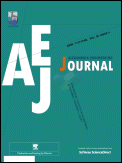
Alexandria Engineering Journal
Fostering global collaboration in engineering advancements.Alexandria Engineering Journal is a premier open access publication dedicated to advancing the field of engineering. Published by ELSEVIER and headquartered in Amsterdam, the Netherlands, this journal has been at the forefront of disseminating innovative research since its inception in the year 2000. With its impressive Q1 ranking within the Engineering (miscellaneous) category and a notable position as #20 out of 307 in the Scopus rankings, it serves as a vital resource for scholars and practitioners alike, ensuring that cutting-edge findings reach a global audience. The journal is accessible to all since adopting open access policies in 2010, thereby facilitating the sharing of valuable insights without barriers. As we approach the convergence of years from 2000 to 2024, the Alexandria Engineering Journal continues to play a pivotal role in shaping engineering practices and underpinning significant advancements in the field.
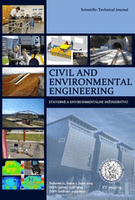
Civil and Environmental Engineering
Exploring the intersection of civil and environmental progress.Civil and Environmental Engineering, published by SCIENDO, is a prominent open-access journal dedicated to advancing research and knowledge in the fields of civil and structural engineering, as well as environmental engineering. Since its inception in Germany, it has been committed to promoting cutting-edge studies and methodologies that address the pressing challenges in these domains. With an ISSN of 1336-5835 and E-ISSN of 2199-6512, the journal is accessible to a global audience, having adopted an open-access policy since 2014 to enhance the visibility and dissemination of scholarly work. The journal currently holds a Q3 ranking in both Civil and Structural Engineering and Environmental Engineering, as of 2023, reflecting its growing influence within the academic community. It operates within a framework of rigorous peer-review standards and encourages contributions that not only contribute to theoretical advancements but also have practical implications for real-world applications. Researchers, professionals, and students alike will find invaluable insights and innovative perspectives in the latest studies published from 2018 to 2024.

HardwareX
Transforming Ideas into Hardware SolutionsHardwareX is an innovative open-access journal published by Elsevier, dedicated to the dissemination of cutting-edge research and developments in the fields of engineering and applied sciences. Launched in 2017, the journal has quickly established itself as a vital platform for researchers and practitioners, focusing on the intersection of hardware design and instrumentation across various disciplines, including Biomedical Engineering, Civil and Structural Engineering, Industrial and Manufacturing Engineering, Instrumentation, and Mechanical Engineering. As of 2023, HardwareX is classified in Q3 in Biomedical Engineering and Q2 in the other listed fields, reflecting its growing influence and recognition in the academic community. With a commitment to facilitating accessible knowledge, HardwareX serves as an essential resource for students, researchers, and professionals seeking to advance their work and collaborate across interdisciplinary boundaries. The journal's comprehensive focus and notable Scopus rankings—such as its position in the 65th percentile for Mechanical Engineering—underscore its significant impact within the scientific community.
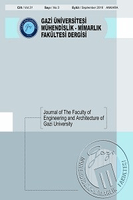
Journal of the Faculty of Engineering and Architecture of Gazi University
Advancing architectural excellence and engineering innovation.The Journal of the Faculty of Engineering and Architecture of Gazi University, ISSN 1300-1884, is an esteemed publication aimed at advancing knowledge in the fields of architecture and engineering. Published by GAZI UNIVERSITY, this journal has established itself as a crucial resource for researchers and practitioners alike since its inception in 1998, with its content spanning up to 2024. Noteworthy for its impact, the journal is categorized in Q2 for Architecture and Q3 for miscellaneous engineering fields, reflecting its significant contribution to ongoing discussions and innovations in these areas. With a Scopus rank of #50 out of 189 in Architecture and #168 out of 307 in General Engineering, this journal resonates with a wide audience by showcasing high-quality research that fosters collaboration and inspiration within the academic community. The journal's commitment to open access facilitates the free dissemination of knowledge, making it an essential read for students, professionals, and researchers looking to contribute to the evolving landscape of engineering and architectural practices. Located in Ankara, Turkey, it serves as a pivotal platform for the international exchange of ideas and methodologies in engineering and architecture.
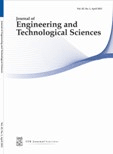
Journal of Engineering and Technological Sciences
Pioneering Insights in Applied SciencesJournal of Engineering and Technological Sciences, published by ITB JOURNAL PUBL, is a prominent open-access journal dedicated to advancing knowledge in various engineering disciplines and applied sciences. With an impact factor that highlights its growing influence, this journal supports a broad scope of topics, including Chemical Engineering, Civil and Structural Engineering, Earth-Surface Processes, Environmental Science, and Materials Science, as well as Mechanical Engineering. The journal has been sharing impactful research since 2013 and continues to bridge gaps between theory and practical application within the engineering community. Leveraging its Q2 and Q3 category quartile rankings in key engineering fields and solid standings in Scopus rankings, it provides a vital platform for researchers, practitioners, and students alike. Based in Indonesia, at the LPPM ITB Rectorate Building in Bandung, the journal emphasizes global contributions and innovations in engineering, making it an essential resource for cutting-edge research worldwide.
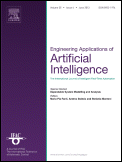
ENGINEERING APPLICATIONS OF ARTIFICIAL INTELLIGENCE
Pioneering the Future of Engineering with Artificial IntelligenceENGINEERING APPLICATIONS OF ARTIFICIAL INTELLIGENCE, published by PERGAMON-ELSEVIER SCIENCE LTD, stands as a premier journal within the disciplines of Artificial Intelligence, Control and Systems Engineering, and Electrical and Electronic Engineering. With an impressive Q1 ranking across these categories in 2023 and a strong presence recognized by Scopus rankings, this journal provides a vital platform for disseminating cutting-edge research innovations and applications that harness the power of AI in engineering. Spanning over three decades of scholarly contributions from 1988 to 2024, the journal appeals to a diverse audience including researchers, industry professionals, and students eager to explore the transformative impacts of artificial intelligence on engineering practices. While not an open-access journal, it ensures that significant advancements in the field remain accessible through library subscriptions. By fostering scholarly dialogue and advancing knowledge in engineering applications of AI, this journal plays an integral role in shaping the future of technology and innovation.